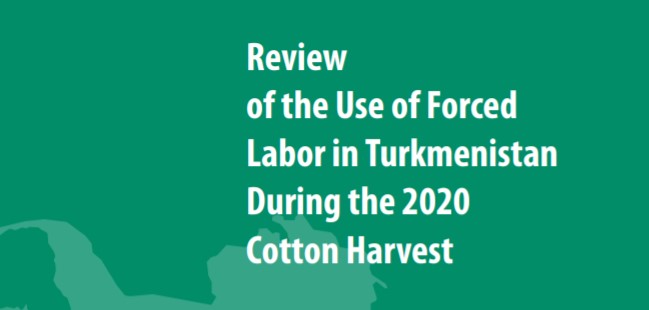
Mar 25, 2021
Cotton bound for global markets from Turkmenistan—the ninth largest producer and seventh largest exporter of the world’s cotton—was again harvested with forced labor last year, finds a new report by the Turkmen Initiative for Human Rights and turkmen.news. Students and public-sector employees—including teachers—were systematically forced into the cotton fields in four of Turkmenistan’s five regions during the 2020 fall harvesting season, documents the report.
“The Turkmen government consistently denies the use of forced labor in the country during the cotton harvest despite abundant evidence to the contrary,” says Ruslan Myatiev, turkmen.news editor and human rights defender.
The report documents the forced participation—under threat of dismissal from their jobs or expulsion from their educational institutions—of public-sector employees and high school, vocational and college students. Report findings are based on evidence documented by trained civil society monitors working for the Turkmen Initiative for Human Rights in four of the five regions of Turkmenistan: Ahal, Dashoguz, Lebap and Mary. Women are especially vulnerable to forced labor in the country because they comprise most of the public-sector workforce traditionally involved in the cotton harvest, says the report.
Public-sector workers, including teachers, were expected to provide so-called voluntary contributions from their salaries or in personal time worked in the fields, or a replacement worker—often their students—for “successful achievement of the state plan for the cotton harvest,” states “Review of the Use of Forced Labor in Turkmenistan during the 2020 Cotton Harvest.” For example, during the country’s eight-day fall break, starting October 22, all teachers in the schools in the Dashoguz region had to pick cotton or pay for a replacement worker to go to the fields.
Forced labor of teachers, doctors and other public-sector employees is crippling health and education public services, says the report, while extortion of money from such employees is exacerbating citizens’ suffering during the country’s worsening economic crisis in the context of COVID-19-related food shortages and rising prices.
“Together with other members of the Cotton Campaign, the Solidarity Center demands respect for international conventions against forced labor. Nobody should be coerced into working the fields, and those who monitor working conditions in the cotton fields must be free to do so,” says Abby McGill, Solidarity Center senior program officer for Eastern Europe and Central Asia.
In Turkmenistan, a Central Asian republic on the northern border of Iran and Afghanistan, cotton cultivation is fully controlled by the state, retaining elements of the planned economy from the Soviet era. It is one of the most closed and repressive states on the planet, currently ranked below North Korea in world freedom scores. The government commits egregious human rights abuses with impunity and there is a total absence of free media. Cotton-sector independent monitors and reporters face ongoing harassment, arbitrary imprisonment, and torture and ill-treatment.
The U.S. State Department ranked Turkmenistan Tier 3, the lowest ranking on its annual Trafficking in Persons report. Cotton from Turkmenistan is on the Labor Department’s list of goods produced with child or forced labor, and the U.S. Customs and Border Protection agency (CBP) prohibits the import of cotton or cotton products from Turkmenistan.
The Cotton Campaign is a global coalition of human rights, labor, responsible investor and business organizations dedicated to eradicating child and forced labor in cotton production in Turkmenistan and Uzbekistan. The Cotton Campaign’s Turkmen Cotton Pledge, committing signatories to preventing cotton from Turkmenistan produced with forced labor from entering their supply chains, has been signed by 119 major apparel and home goods brands and industry associations.
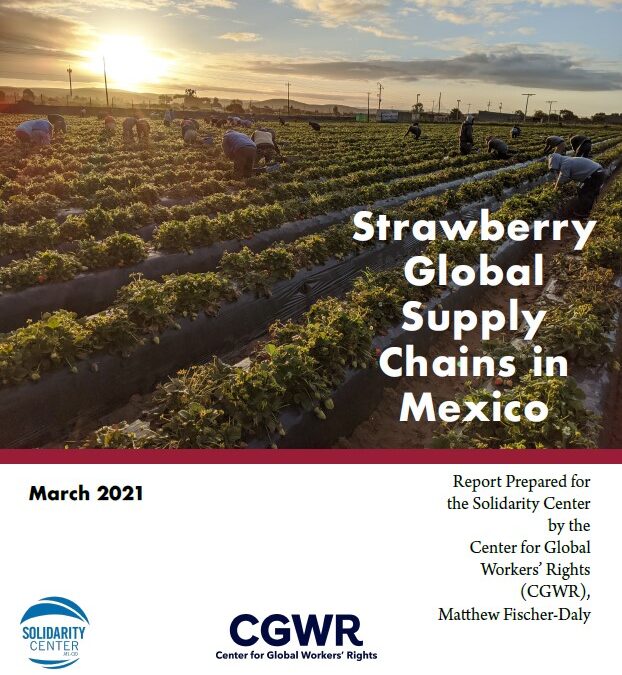
Mar 24, 2021
The governments of Mexico and the United States have supported the growth of the Mexican berry sector by creating conditions for a cheap supply of labor and profit growth. Mexican field workers receive an estimated 12 cents per pound of strawberries sold in U.S. grocery stores, which amounts to 4 percent of the retail price, with the remainder divided between the production company and retailer.
Download here.
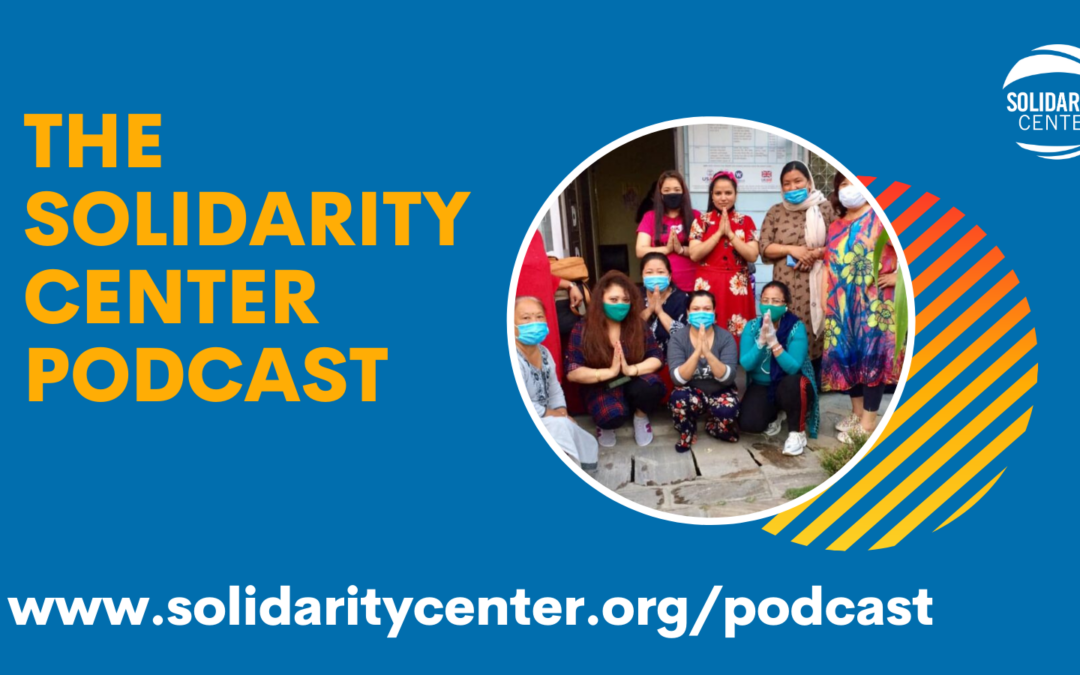
Mar 24, 2021
Migrant workers worldwide have been especially hard hit in the pandemic, suffering reduced pay, lost jobs and little access to social support programs like unemployment insurance. In Thailand, migrant rights groups estimate that since COVID-19, 700,000 workers are either unemployed or not receiving full pay.
But as migrant rights attorney Preeda says on this week’s episode of The Solidarity Center Podcast, Thai unions are standing up for migrant workers, helping them organize to better advocate for their rights and negotiate with their employers to improve working conditions. And, throughout the COVID-19 crisis, unions have helped connect jobless migrant workers with aid organizations and other vital support.
“Before the pandemic of COVID-19, we already connected with the labor unions, especially for those sectors that have migrant workers in the workplace,” Preeda tells host and Solidarity Center Executive Director Shawna Bader-Blau. “We can work with the Thai partners and the unions to continue to promote labor rights and human rights in Thailand. We help and ensure that the workers get respect.”
Billions of Us, One Just Future
 The Solidarity Center Podcast, “Billions of Us, One Just Future,” highlights conversations with workers (and other smart people) worldwide shaping the workplace for the better.
The Solidarity Center Podcast, “Billions of Us, One Just Future,” highlights conversations with workers (and other smart people) worldwide shaping the workplace for the better.
Be sure to catch last week’s episode in which Bader-Blau talks with worker rights advocates in Belarus and Brazil about how workers are standing up for their democratic freedoms in repressive regimes.
Join us for a new episode each Wednesday on iTunes, Spotify, Amazon, Sticher or wherever you subscribe to your podcasts.
SOLIDARITY CENTER PODCAST SCHEDULE
- April 7: Francia Blanco, a domestic worker and trans rights activist reaching marginalized workers through her all-trans domestic workers union
- April 14: Adriana Paz, an advocate with the International Domestic Workers Federation who understands firsthand the power of unions in ensuring domestic workers have safe, decent jobs
- April 21: International Trade Union Confederation President Ayuba Wabba, who explores the Nigerian labor movement’s response to the COVID crisis on workers and discusses the global labor movement’s plans to build back better for workers around the world
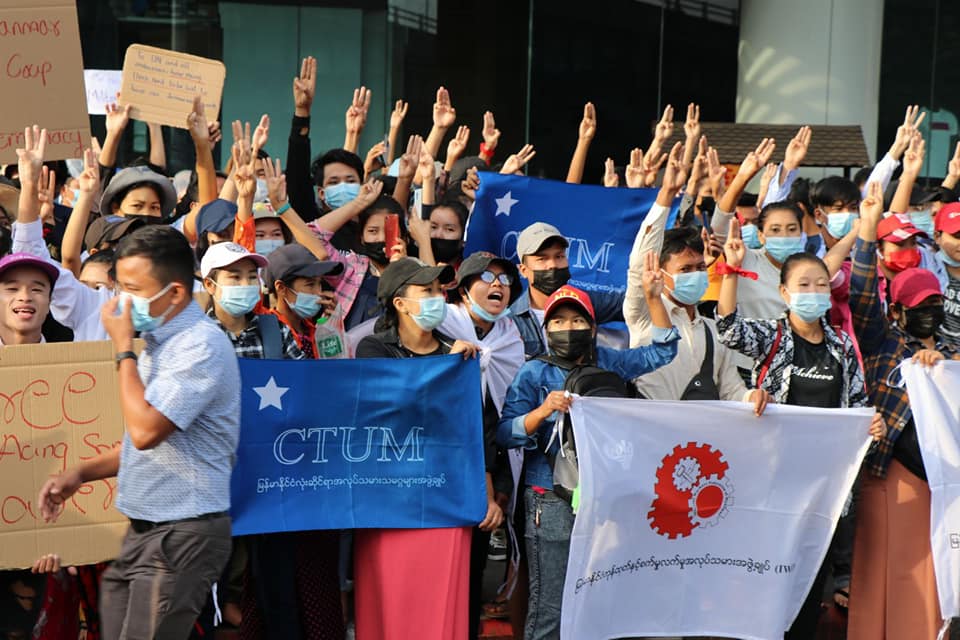
Mar 23, 2021
Nurses, doctors and other health workers rallied in central Myanmar over the weekend, despite the government’s brutal repression against workers peacefully protesting for an end to the military coup launched on February 1.
Military and police have killed at least 249 people and arrested thousands, many of whom are subjected to torture. In February, the military arrested elected officials, including leader Aung San Suu Kyi, and established a ruling junta, declaring a one-year state of emergency, after which an election would be held.
Seeking a return to democratic governance, workers–women in particular–have taken a leading role in the protests, with the country’s 450,000 garment workers especially active in organizing civil disobedience actions and shutting down factories. They are asking international corporate fashion brands to cease doing business in Myanmar until democracy is restored.
Massive industrial factory zones outside Yangon are shuttered, bank employees and port workers have ceased work and other workers across Myanmar have not showed up to their jobs to starve the junta of financial support. (The actions are a hardship for workers who are going without pay. You can help sustain them by contributing to a union-supported campaign here.)
Workers Standing Strong despite Repression
Union leaders have been forced into hiding, and they report military checkpoints along routes out of Yangon where soldiers stop and search cars, looking for passengers who match photos of union leaders.
Workers say the military is widely using live ammunition against civilians. Images of tortured victims are circulating on the internet, as are videos of the military forcing civilians into degrading acts such as crawling in the streets or carrying sandbags until they collapse.
Yet unions refuse to back down and are planning massive demonstrations in coming days to carry on the Civil Disobedience Movement (CDM). Workers say they do not want a return to the repressive days of military rule during which the freedom to form unions and other civil liberties were repressed. Following the more than 20-year military dictatorship, which ended in 2011, workers rushed to create unions and improve their wages and working conditions while having a voice on the job.
Global Community Taking Steps, More Needed
The international community is taking some steps to sanction the junta, although CDM members say much more is needed. On Monday, U.S. Secretary of State Antony Blinken announced new sanctions against members of Myanmar’s military.
The International Trade Union Confederation (ITUC) and UNI Global union released the names of 23 people with close connections to the junta who should be subject to financial sanctions so coup leaders, already subject to financial sanctions, will not use them as proxies.
Meanwhile, the European Union is taking what Burma CampaignUK calls a “pathetically weak and ineffective” action, banning 11 military leaders from vacationing in EU member states, well short of the ban on business with the military Myanmar the CDM seeks.
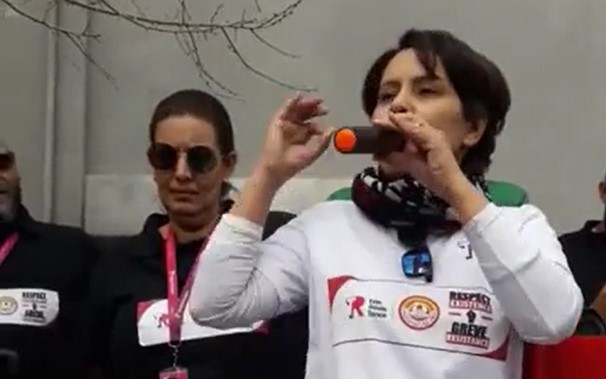
Mar 19, 2021
Citing dangerous work conditions and inadequate wages, an imminent call-center strike was announced this week by French union Solidaires Unitaires et Démocratiques (SUD), with the Moroccan Labor Union (UMT) and Tunisian General Labor Union (UGTT). The strike will target all company sites in France, Morocco and Tunisia on March 24 and 25, said the unions in a joint statement.
Headquartered in France, Teleperformance has more than 300,000 employees across 450 contact centers in 83 countries and serves more than 170 markets. Media outlets have reported on the overcrowding and endangerment of its employees in many countries, including France and Greece, and in Portugal where health authorities ordered the closure of a center.
Health and safety complaints cited in the strike announcement include that workers:
- Are sleeping on the floor in call centers in the Philippines
- Are endangered by insufficient personal protective equipment, including masks, inadequate social distancing and a requirement that they share workstations—including headsets and computers—without adequate cleanup between shifts
- Have their salaries withheld for refusing to work under such unsafe conditions
The strike announcement also calls for wage increases, given Teleperformance’s profitability and the risks faced by workers.




 The Solidarity Center Podcast, “Billions of Us, One Just Future,” highlights conversations with workers (and other smart people) worldwide shaping the workplace for the better.
The Solidarity Center Podcast, “Billions of Us, One Just Future,” highlights conversations with workers (and other smart people) worldwide shaping the workplace for the better.
